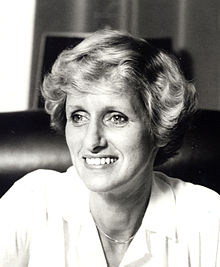Lynn Morley Martin
| Lynn Martin | |
|---|---|
 |
|
| 21st United States Secretary of Labor | |
|
In office February 7, 1991 – January 20, 1993 |
|
| President | George H. W. Bush |
| Preceded by | Elizabeth Dole |
| Succeeded by | Robert Reich |
| Vice Chair of the House Republican Conference | |
|
In office January 3, 1985 – January 3, 1989 |
|
| Leader | Bob Michel |
| Preceded by | Jack Edwards |
| Succeeded by | Bill McCollum |
| Member of the U.S. House of Representatives from Illinois's 16th district |
|
|
In office January 3, 1981 – January 3, 1991 |
|
| Preceded by | John Anderson |
| Succeeded by | John Cox |
| Personal details | |
| Born |
December 26, 1939 Evanston, Illinois, U.S. |
| Political party | Republican |
| Spouse(s) | Harry Leinenweber |
| Education | University of Illinois, Urbana-Champaign (BA) |
Lynn Morley Martin (born December 26, 1939) is a businesswoman and former United States politician.
She was born in Evanston, Illinois, and served as a member of the Winnebago County Board before she served in the Illinois House of Representatives, Illinois Senate, and the U.S. House of Representatives. In the U.S. House, she was vice chair of the House Republican Conference. She served as U.S. Secretary of Labor from 1991 to 1993. She is a member of Gamma Phi Beta Sorority.
Martin taught in the Rockford Public School District prior to and including her time as a local representative.
A loyalist to the Reagan Administration, she assisted then-Vice President George H.W. Bush with his debate preparation for the 1984 Vice Presidential Candidate Debate against Geraldine Ferraro. Bush touted her as a possible running mate in his 1988 presidential campaign, though he eventually selected Indiana Senator Dan Quayle.
In 1990 Martin ran for the U.S. Senate in Illinois against Democratic incumbent Paul Simon. She was considered a formidable challenger, but her campaign floundered — in ads, Martin poked fun at Simon's trademark bow-tie, but the humorous ad campaign was seen by some as petty and mean-spirited. Simon's popularity proved too much to overcome, and he won with 65 percent of the vote, carrying all but two counties in the state; Edwards County in the southeast and McHenry County outside Chicago in the heart of the district Martin represented for most of the 1980s.
...
Wikipedia
